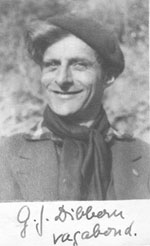 George Dibbern, author of Quest (New York: W.W. Norton, 1941), was a sailor-philosopher, self-declared citizen of the world for whom the 32 foot ketch Te Rapunga (the third of eighteen steps in the New Zealand Maori creation myth: the pre-dawn, “dark sun” moment of anticipation referred to as “longing” or “seeking”) became the means to break free from the constraints and conventions of society, to share his philosophy of the sea, his message of peace, brotherly love and world citizenship at a time when the world was bracing itself for World War II. Of the opinion that a flag represented one’s beliefs and principles, he refused to fly the obligatory swastika Nazi flag and in 1937 first raised the flag of his own design. This represented his belief in equal rights for every person to evolve, each according to his or her individuality, within the family of humankind. He later (1940) rejected his German passport and created his own passport with the following declaration:
George Dibbern, author of Quest (New York: W.W. Norton, 1941), was a sailor-philosopher, self-declared citizen of the world for whom the 32 foot ketch Te Rapunga (the third of eighteen steps in the New Zealand Maori creation myth: the pre-dawn, “dark sun” moment of anticipation referred to as “longing” or “seeking”) became the means to break free from the constraints and conventions of society, to share his philosophy of the sea, his message of peace, brotherly love and world citizenship at a time when the world was bracing itself for World War II. Of the opinion that a flag represented one’s beliefs and principles, he refused to fly the obligatory swastika Nazi flag and in 1937 first raised the flag of his own design. This represented his belief in equal rights for every person to evolve, each according to his or her individuality, within the family of humankind. He later (1940) rejected his German passport and created his own passport with the following declaration:
I, George Dibbern, through long years in different countries and sincere friendship with many people in many lands feel my place to be outside of nationality, a citizen of the world and a friend of all peoples.
I recognize the divine origin of all nations and therefore their value in being as they are, respect their laws, and feel my existence solely as a bridge of good fellowship between them.
This is why, on my own ship I fly my own flag, why I have my own passport and so place myself without other protection under the goodwill of the world.
Unlike Garry Davis who renounced his American citizenship in 1948, after the war had ended, German-born Dibbern made his move at a time most dangerous to himself and his family. His actions did not go unnoticed by the Nazi Party Chapters in New Zealand, USA, Canada and were reported to party headquarters in Berlin. The Gestapo subsequently threatened Dibbern’s wife and three daughters whom he had left, some would say abandoned, in Germany, with reprisals for his actions and initiated steps to force him to return. If he had, he would immediately have been sent to a concentration camp.
Nevertheless, with the exception of a five year internment in New Zealand where authorities refused to recognize his passport, and with a hiatus of four years when, with winnings from a lottery ticket he bought an island in Tasmania to set up a “friendship home”, he pursued his mission to be a bridge of friendship aboard Te Rapunga. He lived by the premise that there was no harsher judge of his actions than his own conscience, no force more absorbing and humbling than the sea. “My life is one with the sea,” he said. “We respect each other and I have no other master.”
References to George Dibbern appear in books on small boat sailing (e.g. Sea Quest by Charles Borden; South Sea Vagabonds, by John Wray, Salt on the Wind by Dan Rubin) as well as biographies of American author Henry Miller who on reading Quest in 1945 was so moved by the book that he wrote to Dibbern as a “brother”—thereby initiating a correspondence friendship which lasted till Dibbern’s death. However, until the publication of Dark Sun by Erika Grundmann, no complete account existed of the man who taught by example, who lived by the principle “serve life and life will take care of you.”